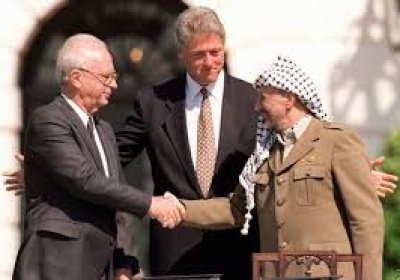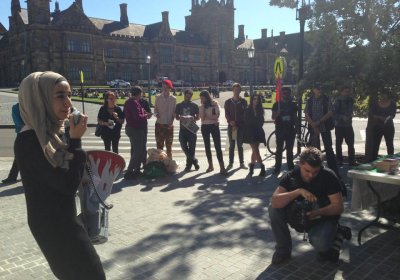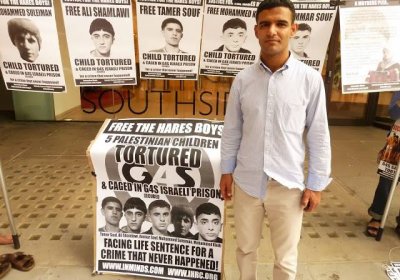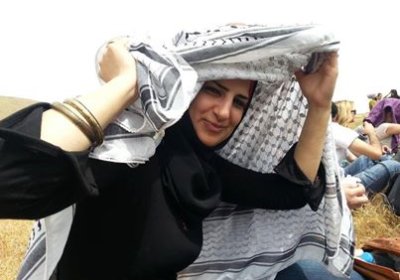The mother of Ribhi al-Battat, 60, gave birth to him in one of the caves inhabited by the people of the small Palestinian village of Zanuta in the West Bank, about 30 kilometres north-east of Be'er Sheva.
Battat says his mother, Mariam, gave birth to her own children and midwifed many of his relatives and neighbours in the caves that once served as homes for centuries and are now used primarily as pens for sheep, or for storage.
Israel
The “peace process” between Israel and the Palestinians that began with the signing of accords in Oslo, Norway, 20 years ago last month was widely celebrated at the time as an important step toward establishing a “viable Palestinian state”.
But in the two decades since, the Palestinian economy has been further decimated. Israel has expanded its Jewish-only settlements in the Israeli-occupied West Bank and Gaza has been subjected to a suffocating siege and regular military strikes.
In short, conditions for Palestinians have worsened, and Israel's colonial domination has been enhanced.
Ahmad Qatamesh is a 62-year-old Palestinian University academic, writer and political activist who has been held in an Israeli jail under administrative detention for more than two years.
Under Israel’s policy of administrative detention, people can be held without charge or trial for indefinite periods.
In 1986, Israeli scientist Mordechai Vanunu took a courageous moral stand against nuclear weapons.
Vanunu exposed Israel’s secret nuclear weapons arsenal to the world after becoming disillusioned with his work as a technician at Dimona Nuclear Research Centre in Israel.
Vanunu revealed Israel had hundreds of advanced nuclear warheads ― the sixth largest stockpile in the world. Under a policy of nuclear ambiguity, Israel still officially denies it has nuclear weapons, despite Vanunu’s revelations and other widespread evidence to the contrary.
About 50 people joined a rally at Sydney University on August 28 to show solidarity with academics Jake Lynch and Stuart Rees, who have been threatened with legal action over their strong backing for the boycott, divestment and sanctions (BDS) campaign against apartheid Israel.
Lynch, Rees and the Centre for Peace and Conflict Studies (CPACS) at Sydney university are facing a legal suit by Shurat HaDin, an Israeli Law Centre.
The Palestinian prisoners holding Jordanian citizenship have suspended their hunger strike following concessions from the Israeli prison authorities to allow them regular family visits from their family members in Jordan.
This was reported in a press conference held in Amman by family members of the prisoners on August 11. The five Jordanian hunger strikers are Abdullah Barghouthi, Mohammad Rimawi, Muneer Mar'i, Hamza Othman al-Dabbas and Alaa Hammad. They had been striking since May 2 for 100 days.
“I want all the people to come to the court and see what democracy in Israel really is,” said the mother of Palestinian youth Ali Shamlawi, being held in jail by Israel on fabricated charges.
On March 14, there was an accident near Salfit in the West Bank when an Israeli settler’s car crashed into the back of Israeli truck. Four people in the car were hurt, one seriously. The truck had stopped on the road due to a flat tire.
Later, this accident was described by the car's settler driver as a stone throwing attack by Palestinian youths.
Palestinian families celebrated on August 14 as Israel released 26 prisoners on the eve of long-stalled peace talks.
Buses carrying the inmates left the Ayalon prison in central Israel late on August 13. Celebrations erupted in the West Bank and Gaza Strip, where thousands of Palestinian well-wishers awaited the buses' arrival.
Fireworks lit the sky in Gaza, where rival Hamas and Fatah supporters alike celebrated to the beat of drums. Some danced while others flashed victory signs and waved flags of the Palestinian factions.
In April last year, many Palestinian political prisoners in Israel went on hunger strike calling for rights to family visits and the end of solitary confinement. Israel eventually conceded their demands.
But now Israel says the deal did not apply to the Palestinian political prisoners who held Jordanian citizenship. These prisoners are still prohibited from family visits and various other basic rights.
A member of Israel's cabinet has declared his backing for killing Palestinian prisoners, rather than bringing them to trial, 972mag.com reported on July 29.
The Huffington Post said on July 29 that Israel announced it would release 104 Palestinian prisoners, as part of the US-brokered plan to renew peace talks with the Palestinian Authority.
Palestinian teacher and activist Sireen Khudiri, 25, was released from an Israeli prison on July 15 after two months in jail. A court decision was made to release her on bail worth 7000 shekels ($2483). Khudiri is now home with her family.
Many people wrote letters and signed petitions to protest Khudiri’s jailing, promoted awareness of her situation or posted or wrote messages of support. It is likely these efforts had an impact in helping free Khudiri.
Since it was founded in 1948, the Israeli state has neglected the rights of Palestinian children, who have been deliberately ill-treated. Many Palestinian children have been killed, injured, jailed, tortured or used as human shields by Israel.
- Previous page
- Page 22
- Next page





